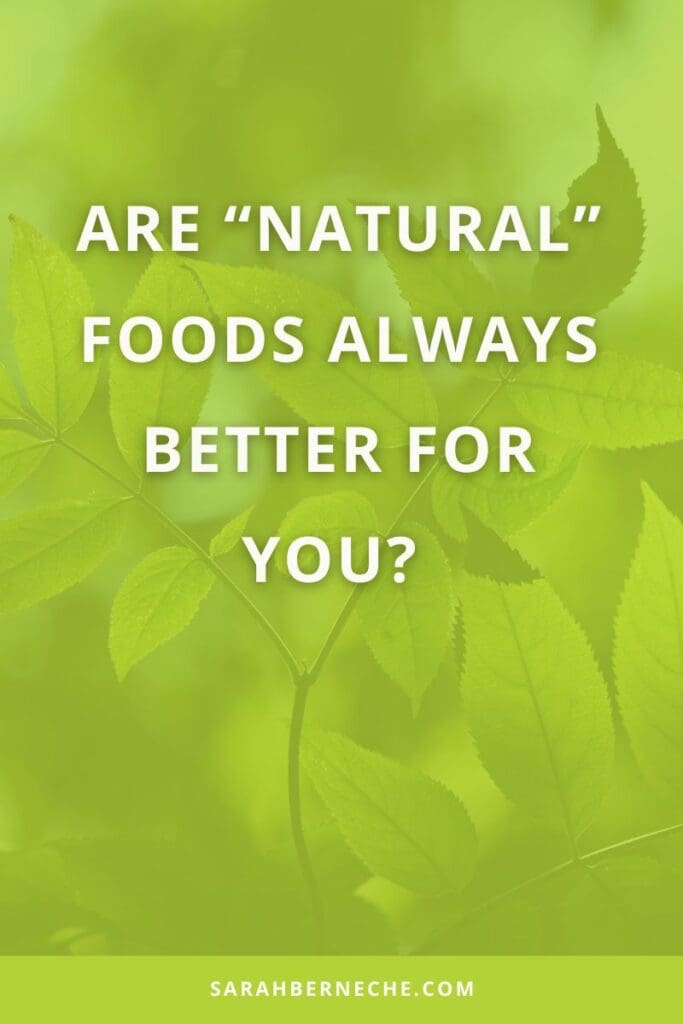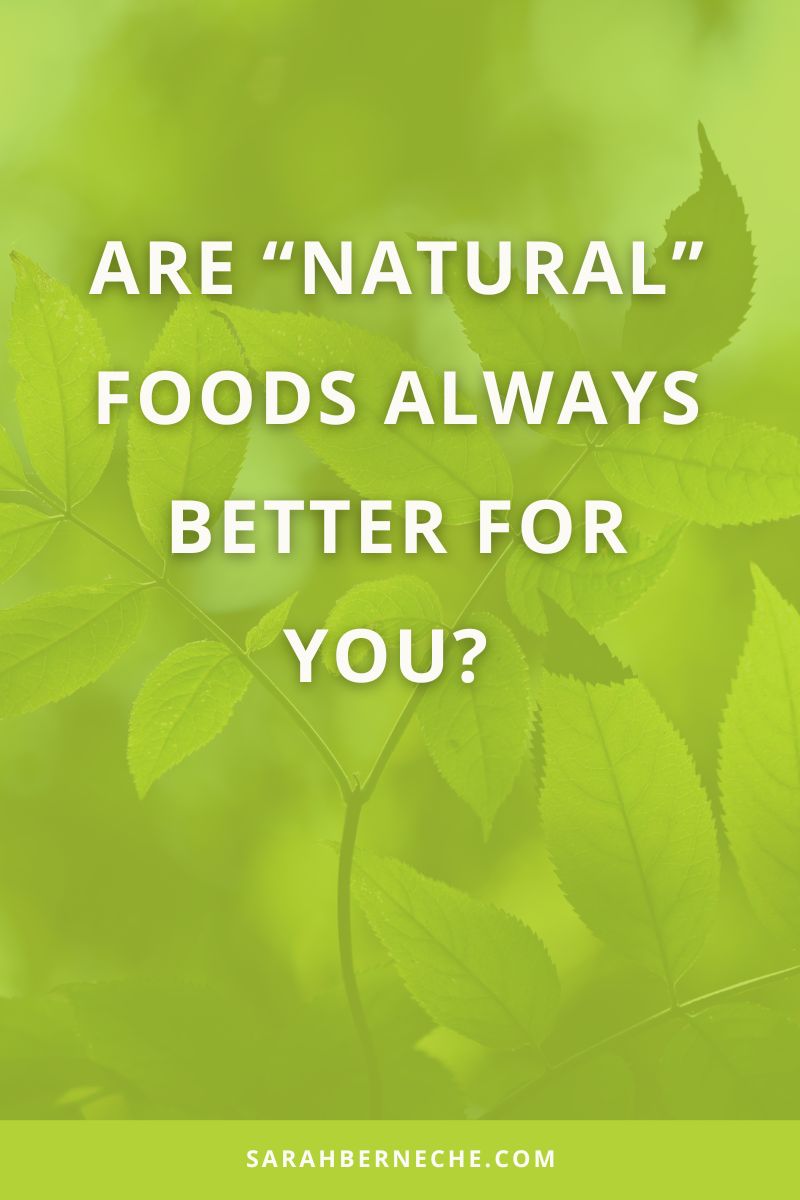Isn’t natural or organic food always better?
If you’ve ever stood in a grocery store aisle agonizing over which yogurt brand or salad dressing to buy, you’re not alone—debating whether the option with the “natural” or “organic” label is better than the one with additives can be so confusing. I have so many crystal clear memories of considering, say, whether to buy local, conventional kale or California-grown organic kale at my local grocery store. I deeply understand why “natural” or “clean” food options seem so appealing, because I’ve been there.

Ample research demonstrates the benefits of eating a diet rich in fresh, minimally processed foods. It’s also true that our food and agricultural industries are (to be generous) imperfect. But the notion that the more “natural” or unrefined a product is, the better, is a misconception. Raw milk, for example, isn’t safer than pasteurized milk, and may contain dangerous bacteria (e.g. Salmonella, E. Coli, Campylobacter, Staphylococcus aureus, Listeria, etc.) It’s banned in Canada for this reason. Seed oils aren’t inflammatory (and may actually hold anti-inflammatory properties, according to the latest research). Red dye doesn’t cause cancer. But like so many myths re-told numerous times, they begin to feel like facts. It’s extremely difficult to debunk them once they’ve entered the chat because it feels like they should be true. In other words, They Make Sense™ — even when the science doesn’t add up.
Natural Doesn’t Mean Safer
Plenty of things found in nature, like arsenic and cyanide, aren’t exactly good for us. And many additives or preservatives that sound scary (“butylated hydroxytoluene,” anyone?) are thoroughly tested and safe in the amounts used in food. In fact, sometimes processing actually makes food safer and more accessible. Pasteurization kills harmful bacteria in milk. Fortification adds essential nutrients to staples such as flour, orange juice, and cereal. Sterilization allows food to carry a longer shelf life. Food dyes may be demonized in Influencer circles, but they’ve made certain foods more appealing and palatable for folks with limited diets, such as kids with sensory sensitivities. Nutrition supplements, like Boost and Ensure, help the ill and elderly get adequate nutrition.
To be clear, I’m not suggesting you need to or should eat in any particular way. You don’t need to love or endorse artificially-coloured cereal or pre-packaged snacks. But what I am saying is that nutrition science, like so many things, is nuanced. I’m saying that what’s “best” for any one of us at any given moment is too individual for blanket statements. And that both minimally processed, whole foods and processed, convenience foods have pros and cons; one isn’t objectively and universally better than the other at all times.
Natural or Organic Food: Preference or Position?
For many folks, especially those recovering from chronic dieting or eating disorders, pursuing “natural” eating can become a socially acceptable form of restriction. Like bikini competitions, it can be a way to maintain rigid food rules. What’s the issue, you might ask? For one, maintaining strict food rules is not a long-term regulation strategy. Relying on rules to feel safe in the world is like building your house on shaky ground. What if you’re on a road trip and a fast food joint is your only option? What if your favourite protein powder brand changes the formulation? What if you learn you accidentally ate something containing artificial sweeteners? Or, what if you’re diagnosed with a devastating illness or issue and can’t maintain the preparation and cooking needed to adhere to your desired way of eating?
You may have heard of the NOVA classification system, which categorizes foods based on how “processed” they are. It’s often used to define what counts as an “ultra-processed” food. But here’s the thing: the whole system is riddled with inconsistencies because the categorization is highly arbitrary. Any food item containing more than five ingredients is flagged as ultra-processed, regardless of the ingredients. The result? A lot of accessible, convenient, and genuinely nourishing foods get unfairly demonized — often, the very things that make food possible and joyful.
In recent years, there’s been a growing assumption that “natural” or similar labels indicate a product is healthier or somehow safer. Those of us who are especially sensitive to health concerns, climate change, animal rights, and other ethical issues may struggle significantly under the weight of nutrition fear-mongering. Minimally processed or “clean” foods may indicate that the item is more nutritious, but it doesn’t make processed or “unnatural” food options categorically bad.
Choosing “Natural” or “Organic” Food In An Unpredictable World
While the term, like so many others, isn’t regulated in any meaningful way, it still conjures images of moral purity and environmental virtue. In my professional experience, when we feel guilty about eating something “unnatural” or highly processed, we’re often grappling with something more profound: a desire to do things right and, ultimately, to feel safe. Even though I genuinely believed my issues with food were really about food at the time, I can see in retrospect that my hyper-vigilance about making the “perfect” food choices was really about controlling how I was perceived. Especially in the context of chronic illness, recovery, or motherhood, “natural” can become a way to maintain an unpredictable world.
But that control often comes at a cost. When food choices are driven by fear, the nervous system doesn’t feel safe — regardless of how “natural” the ingredients are. Here’s what I want you to know: food doesn’t have to be natural to be nourishing.
What makes food “good” isn’t just its ingredient list. It’s how it supports your body, your needs, your culture, and your joy. Sometimes, that looks like a locally grown peach. Other times, it’s boxed mac and cheese, eaten with your fingers on the couch after a long day. Both are valid, both are food, and both can be part of a deeply nourishing life.

Comments +